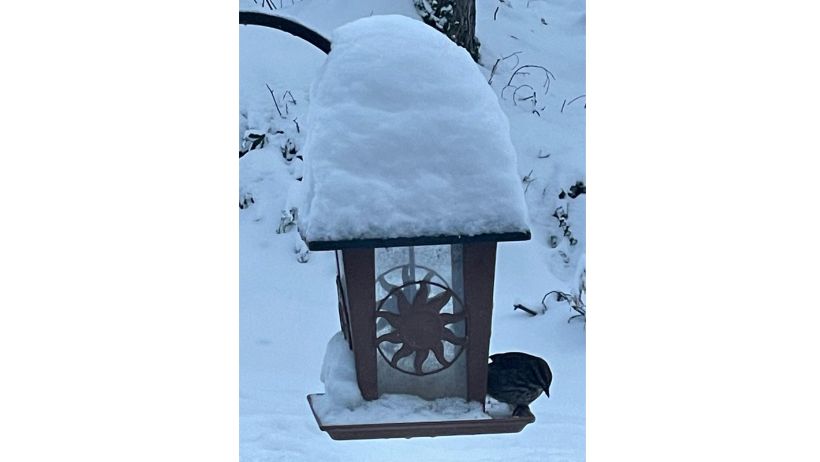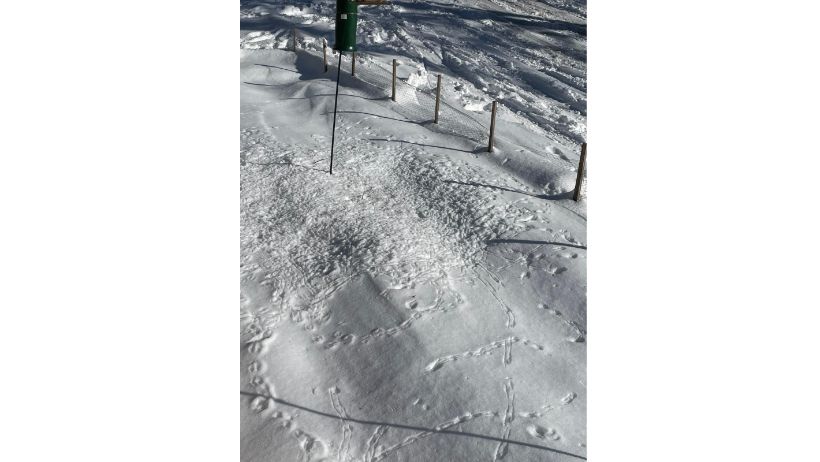Oasis Songs: Musings from Rav D
Friday, February 24, 2023 / 3 Adar 5783
Please check synagogue emails to see the adjustments we have made to this weekend’s Scholar in Residence Program due to snow conditions. We will continue to evaluate and make further changes as necessary.
Tonight I will be speaking about Israel’s constitutional crisis.
Next Shabbat is Meditation Shabbat. It will also mark the inauguration of SHEVET, our post-Kiddush opportunity to sit in Jewish meditation with one another.
Summary: Today marks a year since Russia invaded Ukraine. The horror and loss can make one imagine that life is an unending horror. Instead, this week I focus on the unceasing love that flows around us; we discover love in the messiness of life and in our capacity to offer up terumot, gifts. This week, I relearned this while looking out my front window.
Reading Time: Four minutes
It’s the mirror-smooth, pristine surface of freshly fallen snow, so pure and untouched, that makes all of life feel new and fresh. Just a day later, the marks of messy life are everywhere.

Looking beneath the bird-feeder yesterday morning confirmed this. Instead of a satin-white expanse, there were a thousand crisscrossed talon marks. The birds had been feeding, working to stay warm in the 23-degree weather; the snow was their canvas, recording their mealtime story. In past years, I often felt a soupçon of loss when snow turned dirty, or its surface became scarred, the sort of loss you feel when your new shoes get scuffed, or your car gets its first ding.
This year, though, a wave of love swept over me. I’ve been working on this in my meditation group, opening myself to the love which pulses through all of creation. That initially took the form of my paternal grandparents, who lavished me with a love as simple and pure as fresh snowfall. No conditions. Isn’t that why we have grandparents, to provide us an experience of total love and acceptance? Maybe not every grandparent figures this out, but fortune favored me; Nana Pauline and Poppa Sam had this capacity down in spades. Their love was bright sunlight, beaming warmth and illumination at me every Sunday when we visited their one-bedroom apartment in Rego Park, Queens, NY. It is remarkably healing to know that your existence brings such joy to another. That can carry you through a mess of tribulations.

Something about the death of my mother has tuned me to the quiet frequency of love, which is in every place and corner of the universe. We don’t always allow ourselves this gift, closing ourselves off with judgements and allowing our hearts to be swayed by the sort of spiritually unambitious stories we find in the news or in our own minds, the ones which want us to believe that love is rare, whereas it constantly fills and renews every corner of the universe.
There’s a verse in Parshat Terumah that explains this mechanism. In Exodus 25:2, God tells Moses, “Tell the Israelite people to bring Me gifts; you shall accept gifts for Me from every person whose heart is so moved.” This is followed by the items on God’s registry: gold, silver, copper; blue, purple, and crimson yarns; leather and wood; gemstones, and aromatic incense. Then, six verses later, we read a well-known verse:
וְעָ֥שׂוּ לִ֖י מִקְדָּ֑שׁ וְשָׁכַנְתִּ֖י בְּתוֹכָֽם׃
“And let them make Me a sanctuary that I may dwell among them.”
The above Hebrew verse demands explanation. The verb v’asu, “let them make,” connects what preceded it with what follows. The intention is that by bringing all of those colorful gifts, the people will be able to make the sanctuary from those materials.
The last word of the sentence, b’tocham, however, is a peculiar way to state “among them.” It would have been clearer had the Torah used beineihem, the normal word for “among or between them.” Instead, the Hebrew b’tocham literally means within them. If we bring God gifts and build a sanctuary, God will dwell inside of us. The Netziv, a 19th century Belarusian rabbi, understands Rashi to be saying that this is a promise. If we build it, God will come. I find this concept most compelling by thinking of it as descriptive. When we bring gifts and offer our love to the world, God shows up within us more often. This is the sort of truth that can’t be explained or defended, only experienced. It is the tuning of the heart.
Most of us are both the beneficiaries and benefactors of this pulsing love, though our emotional vision is often occluded to this simple, profound truth—what the Bible describes as “orlat halev,” a heart that is covered up. We constantly receive and offer up small kindnesses that sustain us and others, yet how often do we find ourselves melting into this with a unifying ease?
Looking at the bird tracks beneath the feeder, I felt that ease. My family feeds the birds because my father-in-law loves to look at them. His love for them has penetrated into our younger son, who is an avid bird photographer, preserving their beauty. Laura put on her boots and coat and stepped into the swirling air to top off the seeds. The birds gathered, nibbling and sustained by her act of love. In that moment, I felt God’s love for me—for all of us—so aptly expressed in the Ashrei prayer, poteach et yadekha u’masbia l’khol chai ratzon. “You, God, open your hand and satisfy the needs of all who live.” In this way, the spiritual economy of love came full circle, in which I was both benefactor and beneficiary.
We tend to find fault with the messiness of life. I have sometimes read it as the absence of love, the way the marred, grey snow no longer thrills. The birds pushed my heart, though, instructing it that on the canvas of life, it’s the marks that tell the story of ahavah rabbah, of unending love. Terumah, the gift which came from us to the birds, then back again. Offerings.
Shabbat shalom,
Rav D
Shabbat Table Talk
- Can you recall some examples of full-circle love in your life, in which the ripples of love returned to their origin?
- When have you felt God dwelling within you? What led up to that experience?
If you’d like to continue this discussion, follow this link to CNS’s Facebook page to share your own perspectives on the topics raised in this week’s Oasis Songs. Comments will be moderated as necessary.



